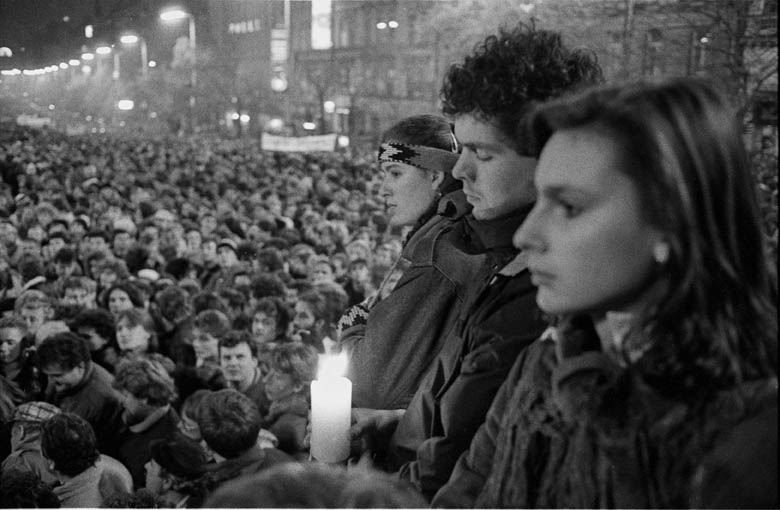In the minds of many Westerners, the end of communism in Eastern Europe was realized when the Berlin Wall came down 20 years ago. Yet other heroic, non-violent actions took place behind the Iron Curtain, including the peaceful Velvet Revolution that brought democracy to the Czech Republic.
This bloodless revolution is the subject of the documentary “The Power of the Powerless,” which will be screening Nov. 19 at 6 p.m. in Humanities A51. November marks the 20th anniversary of the Velvet Revolution, when the communist government in Czechoslovakia was overthrown through a series of peaceful protests sparked by student demonstrations. The film is currently being shown at a number of college campuses and film festivals. At UCLA, the screening will be followed by a conversation with the consul general of the Czech Republic, Ambassador Daniel Kumermann.
The documentary is the first film produced by Agora Productions, a company founded by UCLA alumni Darin Nellis, the executive director, and Cory Taylor, the president and CEO.
While they have different career backgrounds, they were brought together by a mutual interest in using film to promote social change.
“We wanted to be able to use the medium of film and television to communicate … something that would actually be meaningful and not just entertainment for entertainment’s sake,” Taylor said.
Taylor was inspired by the story of Václav Havel, the first president of the Czech Republic. Havel was one of the most vocal dissidents of the communist regime as well as a celebrated playwright, and Taylor thought his role in the Velvet Revolution would be an appropriate subject for his first documentary.
“We thought it was so encouraging that young people had the idealism to challenge the status quo and change the course of history and succeed nonviolently,” Taylor said.
UCLA alumna Christine Hwang, an assistant for Taylor, said the combination of UCLA connections and belief in the values of the film create an ideal working environment at Agora Productions.
“We’re all part of the Bruin family … and all the individuals I work with firmly stand behind the film and its message,” Hwang said.
The screening at UCLA is being co-presented by the UCLA Center for European and Eurasian Studies and the American Jewish Committee. Gosia Szymanska, assistant director of international relations for the committee, said she hopes that students come to the screening in order to witness the progress accomplished in countries like the Czech Republic in only a 20-year period.
“It is really remarkable to see what happened in those 20 years, to see how students took responsibility for their country, took to the streets and decided they wanted freedom. It’s really inspirational to see that in the film,” Szymanska said.
In order to keep the film relevant to today’s audiences, the filmmakers interviewed current Czech college students in addition to people who participated in the Velvet Revolution.
“We assumed that the young people we came in contact with were going to be as excited about their history as we were,” Taylor said.
Instead, the filmmakers found that while filming in Prague, the majority of Czech students were unaware of the role students played in bringing democracy to their country.
“We asked students, “˜Do the principles and values that your parents and that generation stood for in overthrowing communism, does that resonate with you? Does it still exist in society?’ And it’s really fascinating to see that … for the most part, young people growing up in the Czech Republic don’t really care,” Nellis said.
In order to encourage awareness of the Velvet Revolution, both in the Czech Republic and in the U.S., Nellis and Taylor are currently working with professors at a school in Prague to develop a curriculum based on the film that will be distributed with the DVD in high schools and colleges. Ultimately, Taylor said he hopes “The Power of the Powerless” will encourage students to take a participatory role in the future of their country.
“Are we actively engaged in democracy? This is an important question for all of us, particularly for students, because you guys are the ones who are going to shape the future,” Taylor said. “Your participation, or lack thereof, is going to affect the destiny of this country.”
